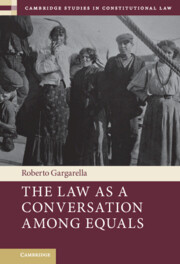Book contents
- The Law As a Conversation among Equals
- Cambridge Studies in Constitutional Law
- The Law As a Conversation among Equals
- Copyright page
- Contents
- Preface
- Acknowledgments
- 1 Constitutionalism and Democracy
- 2 The Law As Conversation among Equals
- 3 “Democratic Dissonance”
- 4 A Constitution Marked by a “Discomfort with Democracy”
- 5 Motivations and Institutions: “If Men Were Angels”
- 6 The Structural Difficulties of Representation
- 7 The Rise and Fall of Popular Control
- 8 The Periodic Vote, or “Electoral Extortion”
- 9 Checks and Balances
- 10 Presidentialism
- 11 Rights
- 12 Social Rights and the “Engine Room”
- 13 Judicial Review
- 14 Constitutional Interpretation
- 15 Constitution Making
- 16 The Birth of Dialogical Constitutionalism
- 17 Why We Care About Dialogue
- 18 “Democratic Erosion”
- 19 The New Deliberative Assemblies
- 20 Conclusion
- Bibliography
- Index
11 - Rights
Citizenship As Repository of Rights
Published online by Cambridge University Press: 25 April 2022
- The Law As a Conversation among Equals
- Cambridge Studies in Constitutional Law
- The Law As a Conversation among Equals
- Copyright page
- Contents
- Preface
- Acknowledgments
- 1 Constitutionalism and Democracy
- 2 The Law As Conversation among Equals
- 3 “Democratic Dissonance”
- 4 A Constitution Marked by a “Discomfort with Democracy”
- 5 Motivations and Institutions: “If Men Were Angels”
- 6 The Structural Difficulties of Representation
- 7 The Rise and Fall of Popular Control
- 8 The Periodic Vote, or “Electoral Extortion”
- 9 Checks and Balances
- 10 Presidentialism
- 11 Rights
- 12 Social Rights and the “Engine Room”
- 13 Judicial Review
- 14 Constitutional Interpretation
- 15 Constitution Making
- 16 The Birth of Dialogical Constitutionalism
- 17 Why We Care About Dialogue
- 18 “Democratic Erosion”
- 19 The New Deliberative Assemblies
- 20 Conclusion
- Bibliography
- Index
Summary
In this chapter, I demonstrate that the declarations of rights that were incorporated into the modern Constitutions relied on a conception of rights that was hostile to democracy. There were various versions of the idea of “natural rights” to which the “founding fathers” subscribed, but the one that prevailed placed rights and citizenship in separate, distant boxes. I also explain, in this chapter, that good part of the prevailing doctrines on the subject are derivations of that original paradigm. Both the idea of rights as “trump cards” that “beat” majority decisions (in Ronald Dworkin’s terms) and the idea that rights constitute a separate sphere (“the sphere of the undecidable” in Luigi Ferrajoli’s work) that must be put out of reach of democracy. According to these prevalent understandings -I claim- rights must be rigorously left to the technical and exclusive care of the judges.
Keywords
- Type
- Chapter
- Information
- The Law As a Conversation among Equals , pp. 149 - 165Publisher: Cambridge University PressPrint publication year: 2022

